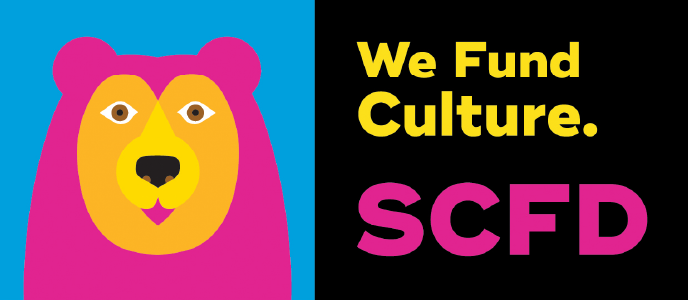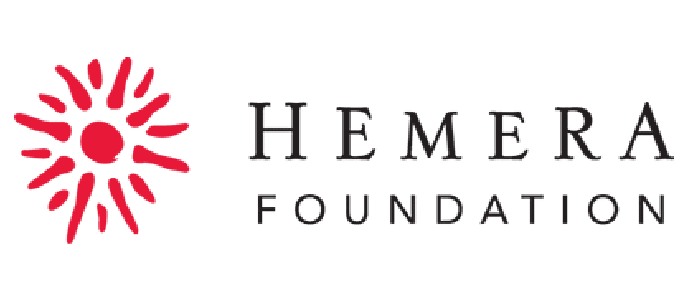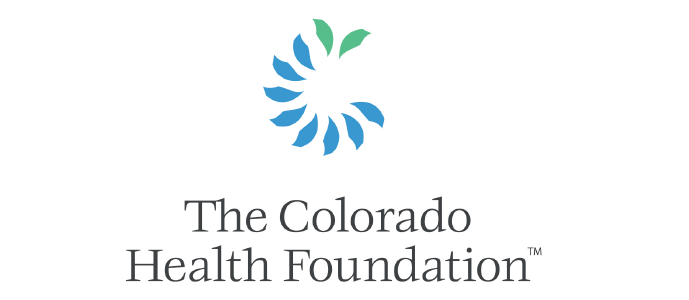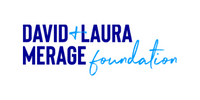Youth artists are the lifeblood of any creative community. Youth artists are innovators, dreamers, and doers. And no one understands this better than our EPIC Arts program mentors!
RedLine’s EPIC Arts program is a semester-long project designed to engage local K-12 children who have limited or no access to quality arts education. Students are paired with RedLine Resident Artists or other community artists to work for a semester to explore social issues through contemporary art.
Our Art Education Director Tya Anthony recently sat down with artist and scientist Efraín Leal Escalera to hear about his experience as a 2022 EPIC Arts Mentor.
Efraín is a proud bilingual, multicultural immigrant scientist/artist from Mexico and has lived in Colorado since 2002. Using nature as his compass and guide, Efraín ventured into the local nonprofit sector through DAVA, the Denver Museum of Nature and Science, the Denver Botanic Gardens, the Butterfly Pavilion, and now, RedLine.
An autodidact polymath through experiential learning, Efraín is an interdisciplinary photographer, activist, entomologist, visual storyteller and educator. His major passions are bringing awareness not only to the pressures on our ecosystems and biodiversity but also to the many disadvantages his intersecting communities face through his diverse interests and multi-perspective life experiences.
Efraín is a firm believer in the potential his communities are capable of and is committed to RedLine’s mission. You can often catch him out with his camera, butterfly net and vest full of jars, photographing and collecting arthropods around Aurora/Denver or catching up on homework for his individualized degree program at MSU Denver.
Watch the video interview and read the full interview transcription below!
Tya Anthony:
Today we're going to talk about our EPIC Arts program. You’re currently an artist mentor for the Green School. I'd like to first have you introduce yourself, and tell us a little bit about your artwork.
Efraín:
Hi, my name is Efraín Leal Escalera, my pronouns are he, el, and them.
A little bit about my artwork: I get a lot of insight and inspiration from nature and from the environment, and from the organisms that I initially started studying in a scientific perspective. But now I'm incorporating them into my artwork and also use my experiences as a human being and undocumented person in this country to feed those projects on the art side of my life.
Tya:
Excellent. And can you tell us a little bit about where you're from?
Efraín:
Certainly. I am originally from Durango, Mexico, which is the Northern part of Mexico, semiarid desert. I've lived in the United States since '96 and at the Colorado in Denver since 2002. And yeah, I've been living here since then. That's a little bit about who I am as a human living on this earth.
Tya:
What inspired you to become an artist?
Efraín:
What inspired me to become an artist? That's a really good question. I think I've always been an artist and inclined towards seeing shapes, and textures, and colors in nature. And that's where I kind of headed most of my life, towards nature and science.
But recently with my undocumented status, science realm was a little unreachable, so I transitioned more into the art scene and the art practice. So it's been there always, but it's been fairly recent-ish that I kind of went back into it and started to incorporate it more into the work that I do, into the communities that I serve.
Tya:
And can you tell me a little bit about the communities that you serve? What does that mean or looked like to you on a day-to-day basis?
Efraín:
Definitely. I think the communities that I serve are a reflection of who I am as an individual. I specifically tap into communities that I feel I represent as a person living in the society.
So I tap into Spanish-speaking communities, the LGBTQ+ communities. And now that I've been tapping more into the art scene, kind of extending out and incorporating other communities that I hadn't really identified myself with, but now I definitely do more.
So for example, the unhoused communities and seeing how some of their experiences kind of reflect with mine. Nature, of course, is a big, big community I represent.
Not only nature, but the people that surround themselves with nature and the environment and their lives in regards to creating positive social change in many interdisciplinary aspects of life.
There's art and the environment, art and science, art and communities that have been displaced or not represented enough. So I think those are the communities that I kind of try and represent in the work that I do.
Tya:
So as an artist, you're participating in the EPIC Arts program, and you're working with the Green School. Can you tell us a little bit about your connection with the Green School or the students?
Efraín:
Yes. It's been a lot of fun kind of taking on this role as a mentor with these kids. A lot of these kids, actually, most of the kids come from nontraditional, whatever that means, nontraditional backgrounds or non…how do I say it? Yeah, a lot of these kids have experienced or are experiencing things that I totally kind of see myself reflected in, in their experiences.
A lot of these kids come from different countries, speak different languages, their lives have been disruptive fairly recently with things happening in the world.
For example, there's a big Venezuelan community in the Denver Green School and kind of connecting with them over their immigration into this country and why they left and having it be still so very fresh in their mind versus me that I left my country years ago and looking back into it now with their perspective so fresh in their minds.
And then there's also kids from Somalia and from Ethiopia. There's also political unrest in those countries and having them think about their life experiences, and bringing art into the mix, and using art as a vehicle to create awareness, or to create a narrative, or to share a perspective, has been so, so, so, so fulfilling, and so inspiring to see these kids putting thought, and effort, and time into a project that hopefully will reflect who they are as human beings.
Tya:
Interesting. And I also had an opportunity twice now to meet your students and kind of sit and chat with them. And I noticed that there is several interpreters that are in the classroom at different times.
Being someone that speaks multiple languages, how do you feel that impacts your ability to communicate, positive or negative?
Efraín:
Wow, communication and language have been a major influence, I mean, in everyone's life, but specifically in mine and in these kids' lives.
Because as I said, I kind of see myself reflected in them and seeing the struggles some kids go through because of language barriers or communication barriers, and seeing that there's now a movement to create more awareness, more inclusion towards people that...I mean, in this case, these kids that don't speak the English language, which is not the official language of the United States.
It's been—honestly, I keep saying eye-opening. Going into the environment of the schools and thinking about my own nephews and nieces and how they have to navigate kind of this multilingual world, because at home they speak Spanish and at school they speak English.
And then for example, kids like me that come from a different country, they have to learn cultures and assimilate to languages and to different modes of living, is definitely important for them to be able to make work, artwork, make decisions, make an impact, and make choices.
Having that opportunity to have someone that is able to communicate with them in their own language, definitely makes a change. Just me being there with some of these kids—like the kids that come from Venezuela, speaking to them in their language and seeing how their faces change when you communicate with them in that language, and seeing that they're being part of something big and there's someone there that's talking to them in their language—I hope it's been as impactful for these kids as it has been for me.
So it's been definitely necessary to show that there's that importance or…yeah, show the importance of being able to communicate with the world.
And sometimes it can be nonverbal, as with their case with the EPIC program. We're creating an art piece and necessarily won't have words, but the communication aspect of it hopefully will make an impact into the visitors that come into RedLine.
Tya:
And that's interesting because art is being used here as a vehicle, as a voice.
Efraín:
Definitely. Exactly, right. And voice can take in so many different ways. A voice can be an actual voice from your body. A voice can be an art piece. A voice can be a recording. A voice can be an image. A voice can be constructed out of clay. A voice can be so many things.
And it's really important to show these kids that their voice, no matter what language they speak, is important. And their voices, outside of the traditional definition of what a voice is, can take in so many different forms.
Tya:
Mm-hmm (affirmative). Right. And so having so many different voices, what's been the greatest challenge and greatest success in communication?
Efraín:
Oh my God. With kids, I think speaking of voices, they have voices, of course. And I have middle school-aged kids. So some kids are a little more focused than others, but it's been a good kind of challenge where I am kind of training myself for when my nephew hits that age, when he's going to be 13 or 14. So it's been a good challenge.
But it's also been a challenge in the way that there's so many kids and kind of being able to find a way to listen to all of them and listen to their perspectives, into their ideas, into the projects and making them feel like they're being listened to, has been kind of sometimes a little challenging because of course there's some kids that are a little more assertive than others.
And me being the ..Well, when I was little, being the introverted, shy kid and quiet, I kind of go towards those kids and want to make them feel more included and ask them more questions, and asking them what they think, and what they feel, and what they see with the project.
I think that's been the challenge, but also the inspiration and making them feel welcome and having someone in the classroom. Like, I never had someone like myself in the classroom.
Tya:
Neither did I. Maybe sixth grade science.
Efraín:
Right. And it's just like...I hope they're going away with something with me being there, especially the quieter kids, the kids that are shy and that are not as assertive with a big personality. I want them to know that even they can have something to say and that they are being listened to.
Tya:
Excellent. And can you break down a little bit how the EPIC process has been for you from start to finish?
Efraín:
Yeah. I'm familiar with the EPIC program and with the Youth Art Mentoring program at RedLine now for a little over a year. So I had experience (well, not direct experience, last year in kind of seeing the process and seeing it from start to finish), and seeing the artwork finally installed in the space, and having people come in, and seeing it and going home with a thought or with an image, myself.
Some of these kids go through a lot and it shows in the artwork. There's one specific one from last year where it was like little dolls in cages that represented the kids over in the border that are coming from Central America.
And that just kind of stuck with me, and thinking about that and thinking about what impact a program like this has in a kid's life and in the people that the art touches has been giving me a lot of food for thought, but the process itself, I really, really appreciate it now more, I think, than before.
I think the team...I really, really like the team, you guys are bringing a lot of hospitality and a lot of willingness to include others, and a lot of opportunity to be open for questions.
And yeah, it's been different. I keep thinking about it because I experienced it before and I experience it now and yeah, the humanistic approach, I can totally, totally see it. And not that it wasn't there before, but I see it clearly with the three of you guys and how you guys feed off of each other.
And I like the options that you have given us versus virtual, versus in-person and being respectful of those things, and having us be able to...What can I say? How can I say this?
Tya:
So like autonomy or your...Yeah.
Efraín:
Yes, yes. Exactly. Yes. Even though we work closely, you haven't been like nagging or like, "What are you doing?" But I do appreciate the effort to include these schools and to have them come into the center and making a space for them, and creating activities, and including these kids.
Because I went for the field trip recently, and seeing the activities that you guys had set up for them. And showing them what artists are doing in regards to social change and how they're doing it, and making it approachable and easy to see, and easy to notice, like with the protest posters. I loved that idea. I really, really did. It kind of...yeah, it gave me so much as to seeing how official programmers are doing the thing.
And seeing, and noticing the effort that you guys are doing. Shawn's doing with the Art Mentoring, and yeah, it's been really, really, really, really good. It's been really cool.
The only thing probably is going to be the...but this is nothing that RedLine or the EPIC program can do. It's time. Time in school, and schools need to be a little bit better about that and allowing a little more time for projects like this. But yeah, it's been a very good introduction into mentoring, into making impact into the kids from my community.
Tya:
Fantastic. And the Green School came to us through RedLine as an introductory or an introduction to social justice in our programs. And they are a new school for EPIC, our EPIC program. And in a couple words, what could you say...So if I said, "EPIC is..." What would you say EPIC is?
Efraín:
EPIC is an opportunity for members of the community, be it adults, be it kids, that want to make, create, do, change, stir up narratives that have been...Not kind of have been, narratives that are important to bring to the forefront of kids' lives and using art as a way to do it, specifically with kids.
Kids are innate artists, they're born artists. It's just kind of society that beats out the artist in this. So kind of bringing these things back, that's what EPIC is. Bringing issues, and stories, and narratives, and combining them with art and having community members engage with community members to make a change.
Tya:
Thank you, Efrain. Do you have any insight on what your project with your students will look like?
Efraín:
Yes. So we are working on mental health and the components of mental health and what that looks like. And there's a couple of different projects with the kids who're working on.
We have a large, large, large group. We have about 60-ish students in two different classes, seven and eighth graders mixed in the two classrooms.
And we decided to go with mental health since that's where this pandemic has kind of taken us and focusing on our mental health and taking care of ourselves, and what aspects of life in the world are impacting our mental health?
So there's a couple of groups working on pollution and how that affects mental health. There's a few kids working on self-reflection, and there's a few kids working on political unrest and how that ties into mental health.
There's a few kids working on a pollution...well, as I said, on pollution and how that further effects the mental health of people that are unhoused in their communities. There's kids that are working on..Let me see, what else. What else?
There's one group of kids that are working…so this group of kids has one kid from Venezuela, one from Somalia, and one from Ethiopia, and they're kind of working on making three different versions of political unrest in their country and how that has impacted the mental health of themselves and their family, and therefore kind of like the community aspect of it.
So there's a lot to get from mental health topic. And hopefully these kids are really digging into how that reflects into their life.
Tya:
Yeah. And then the challenge is to bring all those pieces together, right?
Efraín:
Yes. We were just talking about that yesterday, me and Deb, the teacher. And we're like, "Okay, we have to find a way how we can tie this in together." And that's going to be a little bit of the challenge, but I think we can do it because, I mean, in mental health, it's all interconnected one way or another and that's going to be a little bit of the challenge, but I think we can overcome it. I think we're doing really, really good despite the time crunch, but we're doing good.
Tya:
Good. Yeah. I would say, that's a good challenge for all in thinking about how we interconnect all of these thoughts within our mental health and what it does to us, I think that's exactly what we're looking for to discuss. So anything else you'd like to add?
You did mention, we should very much talk about the collaboration with the teacher at the Green School. And the idea is an artist comes in to a classroom during the regular day, this is not an afterschool program, but this is during their class experience. And how does it...you're almost disrupting the traditional pedagogy. How does it feel being a change maker?
Efraín:
That's something that Deb has been bringing up a lot. She's been telling me that it's really, really cool to have someone come in because the kids, at a certain point, they see the same teacher almost on a constant daily basis, and at some points, I guess it does...And I can imagine it feeling like that, that the kids kind of at some point just don't want to listen anymore and they're just kind of in their own with the world.
So as you just said, coming in and disrupting that norm and kind of also learning from the teacher herself, and how she manages the kids, and how she structures the classroom, has been super insightful for me as an aspiring educator.
But I think I've also, based on what she's told me, she has really, really appreciated me being in there and having someone else for the kids to listen to, and to get narrative and feedback from.
So that dynamic of having someone that's there on a constant basis, versus someone that's coming in, new, and helping in a project, and kind of hyping up the project and giving them ideas, and giving them suggestions, but always, always keeping in the forefront that it's them that are kind of the drivers and they are the ones that are going to be the creators and the makers.
That's a constant like, "Okay." I got to like, "Okay, step back. This is a project that they're going to be the owners of and the drivers." And just kind of keeping that in perspective has been a little, little bit difficult, but it's been not that difficult because these kids have so much in their minds and so many cool ideas.
And it's just a matter of asking them and being persistent about different questions, and different angles, and different perspectives. And just being curious about how their brains work. And then once they get comfortable, they will just get into it.
And then when you see them partnering with their co-students, and just talking and not being disruptive, that is awesome. That is just really, really cool.
And having them have the stuff out and like piecing it together. And they're like, "So what do you think about this? And what do you think about that? And what if we do this? But what if we hang it upside down?"
Yeah, that's been really, really cool. And Deb has been awesome at giving me that opportunity and that freedom to kind of just roam around with the kids and ask them questions, because half of the time she's with them by herself and then the other half I'm there with her.
So I guess in a way, the days I'm not there, she kind of picks their brains and sees how they react versus to when I'm there. And that's been kind of...I don't know what the word is, like it's been balancing. It's been balancing. Yeah.
Tya:
It's good. It's a good collaboration, frankly.
Efraín:
It's an awesome collaboration, And Deb is awesome. She's so, so, so cool. And she's such an awesome artist, and she's so ready for the project and I'm so happy that she...Well, that Denver Green School kind of reached out and be like, "We want to be part of this."
Tya:
Absolutely. We are definitely, definitely happy to have them. And I'm so glad we were able to partner you as an artist with the Green School because everyone wanted to work with you, Efrain. And I had to narrow it down and I think you made a good fit with the Green School.
Efraín:
Thank you. I appreciate that. And yeah, that makes me feel so, so cool that I...yeah. Thank you.
Tya:
Fire. Yes, many. That's good. Great. All right. Well, our exhibition for EPIC will be held in May, and will be posted on the website, on our Facebook and as many social media outlets. That make sense.
And I'm looking forward to seeing what your students, with your mentorship come up with in thinking about social justice, and social change, and social engagement. Just that back and forth communication aspect, I think is so important.
This age and development for artists, and for students, and for we as artists and mentors. I think that that's cyclical cycling of knowledge and experience is so important to this program.
Efraín:
Very much. Very much. So exchanging information is very, very important between communities.
Tya:
Yes. So thank you. Thank you, Efrain.
Efraín:
Thank you. Thanks for the space and for the opportunity. I appreciate it so much!
Learn More About Our EPIC Arts Program
Interested in becoming an EPIC Arts mentor? Learn more about the program and apply today!
Learn more about the EPIC Arts program at RedLine >









